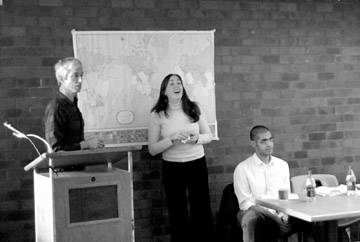The Human Rights Working Group and UMB’s Fair Trade Initiative welcomed the UMB community on December 2 in the Wheatley Lounge to “connect the dots” between globalization, Free Trade Area of the Americas (FTAA), coffee, and the “changing face of public education” with a panel discussion.
Mike Prokosch, an organizer for United for Fair Economy, engaged the audience in an interrogative classroom format. He cleverly illustrated how many garment industries are located outside the United States by asking audience members to check the labels of each other’s clothing.
He asked the audience where the clothing was made and they shouted out countries like, “China!” “Bangladesh!” and “Turkey!” as Prokosch marked the places they cited on a map of the world on the wall.
Prokosch described companies relocating in search of lower cost production sites as, “The race to the bottom.” Nowadays, 60% of garments are made overseas, in sharp contrast to 1970, when the United States controlled the industry. Prokosch asks, “What’s driving this process?”
As audience members shouted helpfully, “Capitalism!” “Cheap labor!” and “Changes in technology!” Prokosch showed the audience a chart of corporate profit margins, which fell sharply after the mid-1960s. As a result, corporations were forced to cut wages, labor, taxes, health care, and environmental costs in order to restore corporate profitability. By moving industries overseas, companies make use of workers willing to work for a fraction of what their American counterparts make while saving on health care and tax costs and benefiting from the lenient environmental laws.
Barbara Salvaterra, who works for Jobs with Justice, spoke quite fearlessly about her views as an anarchist and her experience at the protest against the FTAA in Miami a few weeks ago. Salvaterra, a recent graduate of UMass Boston and actively involved in women’s politics and public policy, is concerned capitalism is not about making the country richer, it is about making elites richer.
According to Salvaterra, reading from the Oxfam Campaigner, “The proposed Free Trade Area of the Americas (FTAA) would create the largest trading block in the world, affecting 800 million people. The FTAA additionally threatens to tip the balance heavily in favor of corporations, promoting private company profits over the interests of the general public.”
The fact that the public could not peacefully protest the FTAA in Miami enraged Salvaterra, who said the presence of an overly militarized police force who didn’t hesitate to use force on the protesters has lessened her faith in democracy.
Shayna Harris from Oxfam America and Asghar Syed of UMB’s Fair Trade Initiative informed the audience about Fair Trade Coffee. Harris said coffee is second to oil as the world’s most heavily traded commodity.
The pair explained that ever since coffee prices hit rock bottom in 2001 there has been a wide-spread humanitarian crisis for 25 million coffee-growing families in over 50 developing countries. Unable to cover their costs of production, small farmers cannot earn the income necessary to feed their families, send their children to school, purchase essential medicines, and stay on their land.
Syed has been working throughout the fall semester to bring Fair Trade Coffee to campus. The Fair Trade Certified label guarantees that small-scale, cooperative farmers get a decent and steady price for their harvest. Syed reminded the audience, “It isn’t about coffee; it’s about globalization.”
Gary Zabel, professor of philosophy at UMB, attempted to outline global and local trends in the deteriorating support given to public education. With an attack on the public higher education system there is “Unfair competition with the private sector,” according to Zabel. In addition, “Fees are twice the tuition. There is a push by the Romney administration to destroy public higher education.”
The globalization panel aimed to raise curiosity and awareness among UMB students. The event was made possible by The Human Rights Working Group and the UMB Fair Trade Initiative.





















































